CIA Sponsored Terror, Civil Liberties, Civil Rights, Criminalizing Dissent, Extraordinary Rendition, Freedom Of Speech, Human Rights, Iraq War, Prosecution of the Bush Administration, Targeting Muslims, Torture, Violations of U.S. and International Law, War Resister, Whistleblowers
Podcast: Play in new window | Download

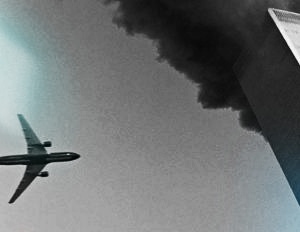
September 11, 2001: Lessons Learned And Overlooked
It has been 23 years ago this week since the attacks on September 11, 2001 in New York City, the Pentagon, and Shanksville, PA, killing nearly 3,000 people and injuring more than 6,000. On that day, the United States had a choice: The George W Bush administration could have treated the attacks as a violation of US and international law, launched a criminal investigation, and brought the perpetrators to justice in accordance with the rule of law. Instead, President Bush waged endless wars against Afghanistan and Iraq, pushed through Congress the USA Patriot Act, opened the notorious detention center at Guantanamo Bay which remain to this day, rounded up Muslims and South Asians for indefinite detention, initiated a wave of civil liberties and human rights violations, and committed wholesale torture against detainees and others.
To assess the legacy of 9/11 and the lessons learned and the lessons overlooked, we’ve invited someone who was at the center of Bush’s War on Terror. John Kiriakou is a journalist, former CIA counterterrorism officer, former senior investigator for the Senate Foreign Relations Committee, and former counterterrorism consultant for ABC News.
In 2007, Kiriakou blew the whistle on the CIA’s torture program, telling ABC News that the CIA tortured prisoners, that torture was official U.S. government policy, and that the policy had been approved by President George W. Bush. He knew what he was talking about. In 2002, he was responsible for the capture in Pakistan of Abu Zubaydah, then believed to be the third-ranking official in al-Qaeda.
He became the sixth whistleblower indicted by the Obama administration under the Espionage Act of 1917 — a law designed to punish spies. He served 23 months in prison as a result of his revelations.
In 2012, the Ralph Nader family honored Kiriakou with the Joe A. Callaway Award for Civic Courage, an award given to individuals who “advance truth and justice despite the personal risk it creates.” He won the PEN Center USA’s prestigious First Amendment Award in 2015, the first Blueprint International Whistleblowing Prize for Bravery and Integrity in the Public Interest in 2016, and also in 2016 the Sam Adams Award for Integrity in Intelligence, given by retired CIA, FBI, and NSA officers.
Guest – John Kiriakou is the author of eight books, including The Reluctant Spy: My Secret Life in the CIA’s War on Terror; and The CIA Insider’s Guide to the Iran Crisis. I met John in 2017 and we collaborated on companion reviews or the Los Angeles Review of Books of the book with the euphemisitic title Enhanced Interrogation written by James E. Mitchell and Bill Harlow, the architects of the American torture system.
—-

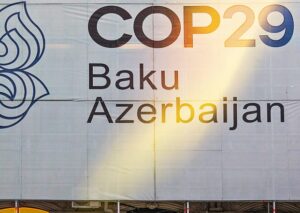
COP 29 Held In Azerbaijan Dictatorship
This year the UN Climate Conference — known as COP29 — will be hosted by the petrol-dictatorship of Azerbaijan. As COP29 delegates prepare to attend talks in Baku, the international community has a chance to shine a spotlight on Azerbaijan’s abysmal human rights record, notably the blockade and ethnic cleansing of Nagorno-Karabakh’s (Artsakh’s) Armenian population last year, and amid the government’s escalating domestic crackdown on freedom of speech, assembly and the press.
Ironically, Azerbaijan’s dictator Ilham Aliyev allocated $1 million to the UN Human Settlements Program, one day before a UN mission visited the Artsakh region who reported ‘no irregularities’ despite the territory being depopulated by Azerbaijan’s military invasion.
As one of the world’s top environmental and fossil fuel polluters, during its invasion of Nagorno-Karabakh, Azerbaijan used the outlawed, lethal and environmentally hazardous White Phosphorus as a chemical weapon on the native Armenian population and their highly forested environment. In that fatal siege, which liquidated all native Armenians, the Azeri government-sponsored blockaders posed as climate activists, while punishing true protesters of lethal pollution, in Azerbaijan, especially journalists and activists in advance of COP29.
Guest – Karnig Kerkonian, one of 23 legal advisors representing the Republic of Armenia at the ICJ (International Court of Justice) in 2021. Karnig’s team presented their case against Azerbaijan, calling on the Tribunal to take provisional measures “as a matter of extreme urgency” to “protect and preserve Armenia’s rights and the rights of Armenians from further harm.” Azerbaijan has ignored the ICJ’s November 2023 ruling to “take all necessary measures to prevent and punish acts of vandalism and desecration affecting Armenian cultural heritage, including but not limited to churches and other places of worship, monuments, landmarks, cemeteries and artifacts.” Attorney Kerkonian has also represented the Armenian community of Old Jerusalem in recent Israeli settler incursions upon the Armenian Quarter.

————————
Censorship, Civil Liberties, Civil Rights, Gaza, Guantanamo, Habeas Corpus, Human Rights, Impeachment, Political Prisoner, Prison Industry, Prosecution of the Bush Administration, Racist Police Violence, Right To Dissent, Supreme Court, Surveillance, Targeting Muslims, Torture, Truth to Power, U.S. Militarism, Violations of U.S. and International Law, War Resister, Whistleblowers
Podcast: Play in new window | Download
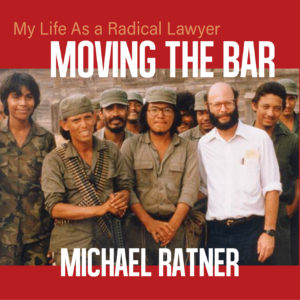
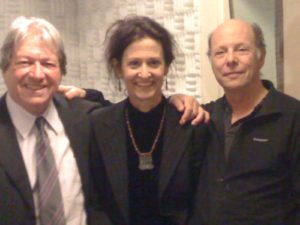
Moving The Bar: My Life As A Radical Lawyer
Hosts Heidi Boghosian and Michael Smith interviewed some of Michael Ratner’s closest friends and colleagues as part of a special broadcast highlighting Michael Ratner’s legal work and mentorship. The special also marked the upcoming release of Michael Ratner’s autobiography Moving The Bar: My Life As A Radical Lawyer published by OR Books. In this one hour taken from the two hour fundraiser broadcast, we hear from attorneys including Eleanor Stein, Richard Levy, Ray Brescia, David Cole and Baher Azmy.
Michael Ratner’s pathbreaking legal and political work is unmatched. He provided crucial support for the Cuban Revolution and won the seminal case in the Supreme Court guaranteeing the right of habeas corpus to Guantanamo detainees. Michael also challenged U.S. policy in Iraq, Haiti, Nicaragua, Guatemala, Puerto Rico and Israel-Palestine. This book is a testament to his unflagging efforts on behalf of the poor and oppressed around the world.
– Marjorie Cohn, Professor Emerita, Thomas Jefferson School of Law
Michael Ratner personified lawyering that brought both radical and human values into challenges to the use of governmental power to violate the essence of the Bill of Rights. From the torture of prisoners after 911 to the massive racial profiling by the New York Police Department, Michael’s voice and vision continue to resonate. This book provides a powerful testament to the spirit of this extraordinary man.
– Attorney Bill Goodman

———————————————-
Civil Liberties, Human Rights, Political Prisoner, Prison Industry, Prosecution of the Bush Administration, Supreme Court, Surveillance, Targeting Muslims, Truth to Power, War Resister
Podcast: Play in new window | Download
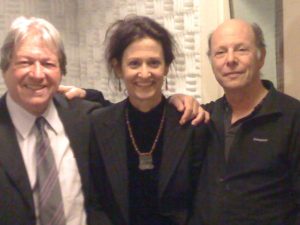
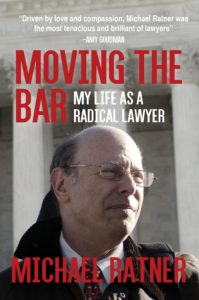
Moving The Bar: My Life As A Radical Lawyer
Michael Ratner’s memoir Moving The Bar: My Life As A Radical Lawyer will be available at OR Books. As listeners know, Michael Ratner was one of the most important civil rights attorneys in our era. He spent his life fighting on behalf of those who state and empire sought to crush, from the leaders of the prison uprising at Attica to Muslim prisoners held in Guantanamo, to Julian Assange.
Michael Ratner (1943–2016) worked for more than four decades at the Center for Constitutional Rights becoming first the Director of Litigation and then the President of what Alexander Cockburn called “a small band of tigerish people.” He was also the President of the National Lawyers Guild. Michae Ratner handled some of the most significant cases in American history. This book tells why and how he did it. His last case, which he worked on until he died, was representing truth-telling whistleblower and now political prisoner Julian Assange, the editor of WikiLeaks. Ratner “moved the bar” by organizing some 600 lawyers to successfully defend habeas corpus, that is, the ancient right of someone accused of a crime to have a lawyer and to be brought before a judge. Michael had a piece of paper taped on the wall next to his desk at the CCR. It read:
Four Key Principles Of Being A Radical Lawyer:
1. Do not refuse to take a case just because it is long odds of winning in court.
2. Use cases to publicize a radical critique of US policy and to promote revolutionary transformation.
3. Combine legal work with political advocacy.
4. Love people.
We hear interviews about Michael Ratner with Chris Hedges’s show On Contact, Attorneys Eleanor Stein, Richard Levy and David Cole.

————————–
CIA Sponsored Terror, Civil Liberties, Human Rights, Iraq War, Military Tribunal, Political Prisoner, Prison Industry, Prosecution of the Bush Administration, Supreme Court, Surveillance, Targeting Muslims, Torture, Truth to Power
Podcast: Play in new window | Download


Hosts Heidi Boghosian and Michael Smith interviewed some of Michael Ratner’s closest friends and colleagues as part of a special broadcast highlighting Michael Ratner’s legal work and mentorship. The special also marked the upcoming release of Michael Ratner’s autobiography Moving The Bar: My Life As A Radical Lawyer published by OR Books. In this one hour taken from the two hour fundraiser broadcast, we hear from attorneys including Eleanor Stein, Richard Levy, Ray Brescia, David Cole and Baher Azmy.
—
Michael Ratner’s pathbreaking legal and political work is unmatched. He provided crucial support for the Cuban Revolution and won the seminal case in the Supreme Court guaranteeing the right of habeas corpus to Guantanamo detainees. Michael also challenged U.S. policy in Iraq, Haiti, Nicaragua, Guatemala, Puerto Rico and Israel-Palestine. This book is a testament to his unflagging efforts on behalf of the poor and oppressed around the world.
– Marjorie Cohn, Professor Emerita, Thomas Jefferson School of Law
Michael Ratner personified lawyering that brought both radical and human values into challenges to the use of governmental power to violate the essence of the Bill of Rights. From the torture of prisoners after 911 to the massive racial profiling by the New York Police Department, Michael’s voice and vision continue to resonate. This book provides a powerful testament to the spirit of this extraordinary man.
– Attorney Bill Goodman

CIA Sponsored Terror, Civil Liberties, Death Penalty, Guantanamo, Habeas Corpus, Human Rights, Iraq War, Prosecution of the Bush Administration, Targeting Muslims, Torture, Truth to Power, War Resister
Podcast: Play in new window | Download
Updates:
- Hosts Discuss the Recent Film – Vice
—-
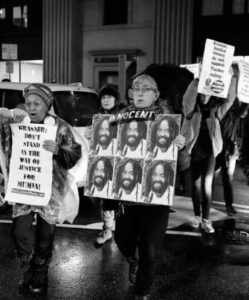
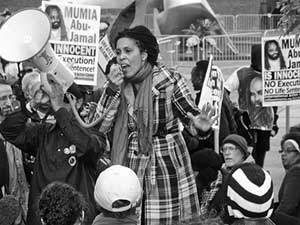
Philadelphia Judge Rules Mumia Abu-Jamal Can Reargue Case
We are pleased to begin the new year with a major development that might pave the way to freedom for former Black Panther Mumia Abu-Jamal, the award-winning journalist convicted in the 1981 murder of Philadelphia police officer Daniel Faulkner.
In late December, a Philadelphia Common Pleas Court judge ruled that Mumia can reargue his appeal in the case before the Pennsylvania Supreme Court. The decision hinges on a recent Supreme Court Decision with similar facts. Then presiding Chief Justice Ronald Castille failed to excuse himself due to his prior role as Philadelphia district attorney in Mumia’s earlier appeal. Mumia’s attorneys argued that Castille made statements related to persons accused of killing police officers that indicated he should have recused himself. His campaign speeches and letters urged capital punishment in police-killing cases.
As we’ve long reported, Mumia spent nearly three decades on death row before his sentence was thrown out over flawed jury instructions. In 2001, prosecutors agreed to a sentence of life without parole.
Judge Leon Tucker’s decision this past December was split; he denied Mumia’s claim that Castille had, “personal significant involvement” in the case while in the DA’s Office.
Guest – Professor Johanna Fernandez, is a native New Yorker. She received a PhD in History from Columbia University and a BA in Literature and American Civilization from Brown University. Professor Fernández teaches 20th Century U.S. History, the history of social movements, the political economy of American cities, and African-American history. She has previously taught at Carnegie Mellon University in Pittsburg, PA and Trinity College in Hartford, CT and is, most recently, the recipient of a Fulbright Scholars grant to the Middle East and North Africa that will take her to Jordan in spring 2011, where she will teach graduate courses in American History. She is with the Campaign to Bring Mumia Home.
—-
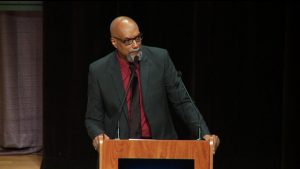

Anti-War Movement Gains Traction Amid Perpetual War
American wars undertaken in the Middle East have been raging for an historically unprecedented 17 years, ever since the attack on the World Trade Center and the Pentagon on September 11, 2001.
President George W. Bush understood that being at war president would boost his sagging popularity. First, he ordered the attack on Afghanistan on the pretext that it harbored Osama bin Laden and would not give him up.
Then, in 2003, with designs on Iraq’s oil, the United States of America unleashed an illegal war on that country. It was falsely claimed that Iraq had weapons of mass destruction and ties with Al Qaeda. The war involved the bombing of cities and was supposed to be of short duration. Americans were advised that the Iraqi people would welcome the American intervention. Their president Saddam Hussein was captured and executed. Hundreds of thousands of people were killed and hundreds of thousands we’re made refugees.
The entire Middle East was destabilized as the wars spread under the Obama administration. His secretary of state Hillary Clinton planned the aggression against Libya, where its leader Mohamar Qudaffi was captured and bayoneted to death. The country was destroyed. Clinton said at the time “we came, we saw, he died.“
The war was extended Syria, which the United States had coveted since World War II. The United States and Israel failed to kill its leader Bashar Assad but reduced much of the country to ruins and created thousands of refugees Then the United States militarily backed and supplied its Allie Saudi Arabia in its war in Yemen where 85,000 children have died of starvation.
All in all the United States made war on seven middle eastern countries simultaneously. Then, recently, fulfilling a campaign promise, President Donald Trump, the commander-in-chief, ordered the withdrawal of troops from Afghanistan and Syria. He has been opposed in this by the entire establishment, the military, the media, the intelligence agencies, and both the Republican and Democratic parties.
Guest – Ajamu Baraka, an initiator and leader of the Black Alliance for Peace, an organization which is part of the coalition. He has also just returned from a meeting of international leaders because the USA’s involvement of a possible overthrow of the government of Venezuela. Ajamu Baraka helped organize a conference in Baltimore Last month concerning USA’s 800 bases abroad particularly the new ones in Africa.
CIA Sponsored Terror, Civil Liberties, Human Rights, Iraq War, Military Tribunal, Political Prisoner, Prison Industry, Prosecution of the Bush Administration, Supreme Court, Targeting Muslims, Torture, Truth to Power, War Resister
Podcast: Play in new window | Download
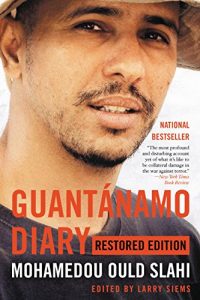
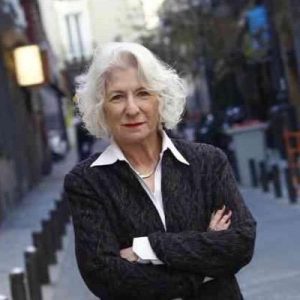
Guantanamo Diary: Mohamedou Ould Slahi
The American offshore prison camp in Guantánamo, Cuba is still operating. After the attacks on September 11, 2001, it was set up as a place where neither American or international law would apply and where prisoners could be brought, tortured, detained forever, and never charged with a crime. Ten years ago, former President Obama promised to close the offshore prison when he ran for office. It remains up and running to this day. Mohamedou Ould Slahi spent 18 years of his life there. He was an electrical engineer from Mauritania in Africa and educated in Germany. He was 32 years old when he was apprehended in his home, taken to Jordan where he was tortured, then to Afghanistan, then to Guantanamo and 16 years later at age 48, he was released. He walked out of Guantanamo Bay Prison in October 2016 without being charged with a crime and returned to his native Mauritania.
While in prison in 2005 he wrote a memoir, in English, one of his four languages. His attorney Nancy Hollander had asked him to do it and she finally got it declassified in 2012 but with heavy redactions. It was made into a book, titled Guantánamo Diary, and published in 2015 and became an international bestseller.
In it, he describes how he was tortured in ways personally approved by then Defense Secretary Donald Rumsfeld. Torture is a criminal act under both US and international law. As many know, Rumsfeld has yet to be prosecuted.
Guest – Mohamedou Ould Slahi joins hosts from his native country of Mauritania where he is a writer. He is the author of Guantanamo Diary.
Guest – Attorney Nancy Hollander has been a member of the firm Freedman Boyd Hollander Goldberg Ives & Duncan, P.A. since 1980 and a partner since 1983. Her practice is largely devoted to criminal cases, including those involving national security issues. She has also been counsel in numerous civil cases, forfeitures and administrative hearings, and has argued and won a case involving religious freedom in the United States Supreme Court. Ms. Hollander also served as a consultant to the defense in a high profile terrorism case in Ireland, has assisted counsel in other international cases and represents two prisoners at Guantanamo Bay Naval Base. Nancy is co-author of WestGroup’s Everytrial Criminal Defense Resource Book, Wharton’s Criminal Evidence, 15th Edition, and Wharton’s Criminal Procedure, 14th Edition. She has appeared on national television programs as PBS Now, Burden of Proof, the Today Show, Oprah Winfrey, CourtTV, and the MacNeill/Lehrer News Hour.
—-
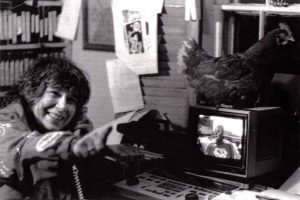

Manhattan Neighborhood Network Supreme Court Case
Is a public-access TV channel run by private nonprofit corporation subject to the First Amendment? The Supreme Court will consider that question in a case involving the Manhattan Neighborhood Network or MNN. In 1991 MNN was designated to operate as a public-access channel in New York City. The Manhattan Borough President has no control over MNN but does pick two of its thirteen board members.
In 2012 Jesus Melendez, an occasional contributor to MNN, was suspended for trying to attend a board meeting. His associate Deedee Halleck then videoed him outside talking about the situation. MNN banned the video from airing. Melendez and Deedee brought a First Amendment claim against MNN asking if the network is a state actor for purposes of their First Amendment rights. The district court said no, noting that, while it was a close call, other circuits had concluded that privately run public-access networks were not state actors.
The Supreme Court hasn’t directly weighed in on this question although Justice Anthony Kennedy, in a 1996 concurrence in a case dealing with laws regulating content on public-access channels, wrote they should be considered state actors who run public fora and thus be subject to the First Amendment. Justice Clarence Thomas disagreed in his concurrence, writing that “franchising authorities require cable operators to create public access channels, but nothing in the record suggests that local franchising authorities take any formal easement or other property interest in those channels that would permit the government to designate that property as a public forum.”
Defenders of MNN claim, that while it’s possible that some public-access channels could be rightly called state actors, the Court should take the case to clarify the state-actor test and to review the Second Circuit’s unnecessarily broad opinion.
Guest – Deedee Halleck one of the plaintiffs in this case and among the top media activists. She’s co-founder of Paper Tiger Television and also the Deep Dish Satellite Network, the first grass roots community television network. She is Professor Emerita in the Department of Communication at the University of California at San Diego.
Guest – Attorney Paul W. Hughes, a partner in the law firm Mayer Brown’s appellate and Supreme Court practice. Paul has handled more than 200 appellate matters, more than 125 of which were in the U.S. Supreme Court. In 2017The American Lawyer named Hughes “Litigator of the Week” in connection with his immigration work.

















